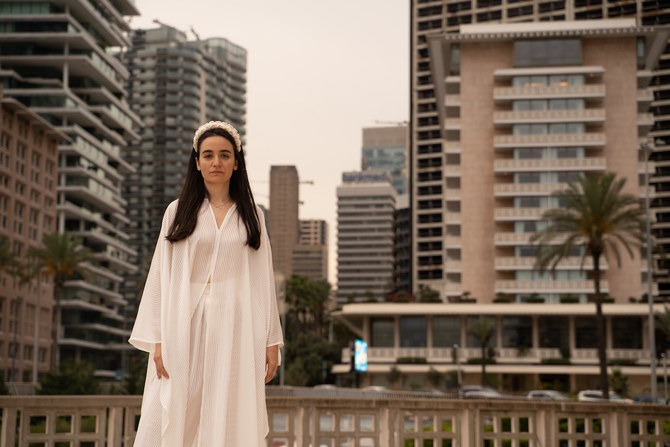Five years ago, Mayssa Jallad, the talented Lebanese singer-songwriter, found herself at a crossroads, torn between her passion for music and her love for urban research. Working tirelessly at an architectural firm in New York, she yearned to pursue both of her passions but felt constrained by the demands of her job. Faced with an existential crisis, she made a bold decision—to leave her job and return to her roots in Beirut, where she could embark on a creative journey that blended music and architecture in an experimental project.”People thought I was crazy,” Jallad confesses with a laugh, reminiscing about the beginnings of her unique artistic venture. “But I went on this journey of trying to create this experimental project. What if we talked about Lebanon’s difficult history through architecture and music? What if it could become—through music, through intervention—part of our heritage?”Thus, “Marjaa: The Battle of the Hotels” was born—a remarkable debut solo album that is an extension of Jallad’s master’s thesis at Columbia University. The album delves into the Battle of the Hotels, a significant event that took place during the early stages of the Lebanese Civil War. Jallad’s thesis argued that architecture should be viewed as a principal character in the world’s first high-rise urban battlefield.Released earlier this year on the Lebanese indie label Ruptured, “Marjaa: The Battle of the Hotels” is a hauntingly beautiful collection of songs that paint a vivid picture of a city deeply scarred by its past. The first four tracks represent a “walk in a very empty city,” where Jallad was struck by the sight of vacant skyscrapers—a poignant reminder of the past, when these very structures were used as weapons in the conflict. Through her music, she addresses the disregard for the city’s needs by real-estate-focused developers, and she strives to preserve the historical value of these buildings through intervention.Jallad’s collaboration with oud player and singer Youmna Saba laid the groundwork for the album’s creation, exploring how silence could be expressed through vocal melodies and muted guitar playing. The outcome is a stark and atmospheric soundscape that occasionally delves into dark ambience, capturing a sense of militarism and otherworldliness.As the album evolved, Jallad found her inspiration in giving voice to the buildings themselves—the iconic structures that played a significant role in the Battle of the Hotels. Haigazian University’s campus, the unfinished skyscraper Burj El Murr, and the Holiday Inn—designed by André Wogenscky and Maurice Hindie—feature prominently in her music. Through haunting melodies and ethereal vocals, she tells the stories of these structures, making them integral characters in her musical narrative.For Jallad, “Marjaa” marks an exciting turning point in her career. The album’s success has opened up new avenues for her, with a vinyl version set to release in October and a series of European concerts planned for November. She acknowledges that being able to consider music as a full-fledged career has been a long-cherished dream come true.Beyond her musical endeavors, Jallad continues to work as a researcher for PROCOL Lebanon, a Beirut-based research initiative founded by the Institute for Global Prosperity. She remains dedicated to using her music to shed light on the difficult history of her homeland and its impact on the present. Her passion for exploring the interplay between history, architecture, and music fuels her creative pursuits, and she is eager to delve into new research for future musical endeavors.As “Marjaa: The Battle of the Hotels” continues to resonate with audiences worldwide, Mayssa Jallad stands as a bridge between two seemingly distinct worlds—architecture and music. Her bold and innovative approach not only honors her country’s past but also shapes a unique artistic legacy that intertwines the two realms seamlessly. In her journey, she demonstrates that music has the power to preserve and give voice to history, leaving an indelible mark on the cultural heritage of Lebanon and beyond.
Mayssa Jallad: The Melodic Bridge Between Architecture and Music in “Marjaa: The Battle of the Hotels”












